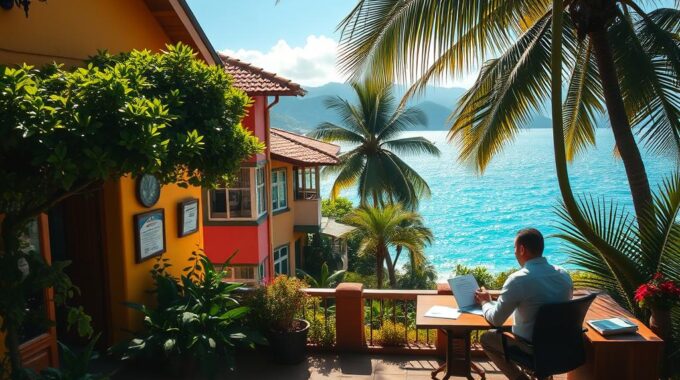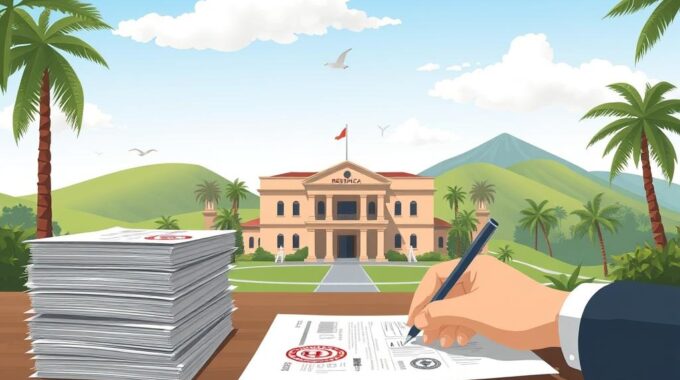Learn about hard money lending for financial freedom Costa Rica. GAP Investments offers tailored financing from $50,000 to $3,000,000.

How Long to Get Costa Rica Residency? | CRIE Experts
Over the last five years, the number of foreign residents in Costa Rica has surged by 25%. This tropical paradise attracts individuals and families seeking a new home with its stunning landscapes and welcoming culture. Understanding the immigration process is crucial for a smooth transition.
CRIE, with over 20 years of experience, has helped thousands navigate the complexities of residency applications. Their expertise ensures precision in documentation and adherence to immigration laws. Clients can start their journey with a personalized consultation, tailored to their unique needs.
Whether you’re planning to retire, invest, or relocate with your family, CRIE offers solutions that fit. Their team is available via phone, WhatsApp, and email to guide you every step of the way. This article provides comprehensive insights into the residency process, backed by factual immigration laws.
Overview of Costa Rica Residency and CRIE’s Legacy
Costa Rica’s residency programs have become a top choice for individuals seeking stability and opportunity. The country’s legal framework ensures a transparent and efficient immigration process. With options tailored for retirees, investors, and families, Costa Rica offers a welcoming environment for newcomers.
CRIE has been a trusted partner in this journey for over two decades. Their expertise in handling complex document requirements ensures clients meet all application criteria accurately. This precision minimizes delays and maximizes success rates.
Experience and Trusted Services
CRIE’s legacy is built on thousands of successful residency applications. Their team understands the nuances of Costa Rican immigration laws. From initial consultations to final approvals, they provide reliable guidance every step of the way.
Why Choose Costa Rica for Residency
Costa Rica’s business-friendly climate and clear immigration requirements make it an attractive destination. The country’s commitment to legal stability ensures a smooth transition for applicants. With CRIE’s support, navigating these processes becomes straightforward and stress-free.
What factors influence the processing timelines for residency applications? The next section explores this in detail.
How long does it take to get Costa Rica residency?
Understanding the timeline for residency approval is essential for planning your move. The process typically spans between six to twelve months after submitting complete documentation. However, several factors can influence this period, including application volume and document preparation.
- Application Volume: High demand can extend the waiting period.
- Document Preparation: Missing or incomplete paperwork can cause delays.
- Legal Requirements: Ensuring all documents meet Costa Rican standards is crucial.
While some cases may proceed faster, applicants should prepare for a process that could take months or even years. CRIE’s expertise in streamlining documentation helps minimize delays and ensures a smoother experience. Their team provides insights into accelerating the approval process, saving valuable time.
Setting realistic expectations is vital. For example, temporary residency often takes six to twelve months, while permanent residency requires an additional three-year period. Applicants can learn more about the naturalization process to better understand their long-term options.
By working with experienced professionals like CRIE, applicants can navigate the process efficiently and avoid common pitfalls. This ensures a seamless transition to becoming a resident in Costa Rica.
Understanding the Costa Rican Immigration Process
Navigating the Costa Rican immigration process requires a clear understanding of legal steps and requirements. The process involves multiple stages, each overseen by local authorities to ensure compliance with immigration laws. Applicants must prepare their documents meticulously to avoid delays.
Key Legal Steps and Authorities
The immigration process begins with document preparation. Foreign documents must be notarized and authenticated to meet Costa Rican standards. The Costa Rican Immigration Department and public security authorities review applications to ensure all requirements are met.
Having the correct passport and supporting certificates is crucial. These documents serve as proof of identity and eligibility. Authorities play a vital role in expediting the process, ensuring applications are processed efficiently.
Temporary vs. Permanent Residency
Temporary residency is often the first step for newcomers. It requires proof of income or investment, such as the Rentista or Investor programs. Temporary residency allows individuals to live in the country while preparing for permanent status.
Permanent residency offers long-term stability. Applicants must meet specific criteria, including a minimum period of temporary residency. Permanent residents enjoy benefits like access to healthcare and education, making it a popular choice for families and retirees.
For more details on the residency application process, consult with experts like CRIE. Their team ensures every proof submitted is compliant, minimizing delays and maximizing success.
Exploring Different Routes to Costa Rican Residency
Costa Rica offers diverse pathways for individuals and families seeking to establish residency. Each route has specific requirements tailored to different eligibility scenarios. Whether you’re retiring, investing, or reuniting with family, understanding these options is key to a successful application.
Pensionado, Rentista, and Investor Programs
The Pensionado program is ideal for retirees with a guaranteed lifetime pension of at least $1,000 per month. Applicants must provide proof of income, such as a pension letter, to qualify. This route offers a straightforward path to temporary residency.
The Rentista program requires a stable monthly income of $2,500 for 24 months. Alternatively, a $60,000 investment in a Costa Rican bank can meet the criteria. This option is popular among individuals with consistent financial resources.
For those looking to invest, the Investor program requires a minimum of $150,000 in business or real estate. This route not only grants residency but also contributes to the local economy. Applicants must submit documented proof of their investment.
Residency by Family Ties
Family connections can also lead to residency. Spouses of Costa Rican citizens or permanent residents can apply through marriage. A marriage certificate and other supporting documents are required to validate the relationship.
Parent-child relationships are another pathway. Dependent children under 25 can be included in applications without separate proof of income. This option ensures families can stay together while navigating the immigration process.
Official letters and documented proof are essential for all applications. CRIE’s tailored services simplify the selection of the best route, ensuring compliance with immigration laws. Their expertise minimizes delays and maximizes success rates.
Essential Documentation and Application Requirements
Preparing the right documents is the cornerstone of a successful residency application in Costa Rica. Immigration authorities require specific certificates and notarized paperwork to verify eligibility. Ensuring these documents meet official standards is critical to avoid delays or rejections.
Required Certificates and Notarizations
Applicants must provide several key documents to support their residency application. These include:
- Birth certificates to verify identity and age.
- Proof of income, such as pension letters or bank statements, to demonstrate financial stability.
- Marriage records for those applying through family ties.
All foreign documents must be notarized and authenticated according to Costa Rican law. This process ensures their validity and compliance with immigration requirements.
Consistency in details like income, company affiliations, and marital status is essential. Any discrepancies can lead to complications during the review process. Temporary residency applications often have different document requirements compared to permanent residency. For example, temporary residency may require proof of monthly income, while permanent residency demands additional proof of long-term stability.
CRIE plays a vital role in guiding applicants through this process. Their expertise ensures every document meets official standards, minimizing the risk of delays. They also provide clarity on which documents are frequently questioned by immigration officials, helping applicants prepare thoroughly.
By focusing on accurate documentation and proper legalization, applicants can navigate the residency process more efficiently. This approach ensures a smoother transition to life in Costa Rica.
Consultation and Pricing: Personalized Immigration Services
CRIE’s personalized approach ensures every applicant’s needs are met with precision. Their team offers tailored solutions, considering factors like family size, financial status, and document requirements. This ensures a smooth and efficient process for securing residency in Costa Rica.
Tailored Residency Options
CRIE provides customized guidance based on individual immigration profiles. Whether you’re applying for a visa, exploring real estate opportunities, or seeking nationality, their experts help you choose the best path. Their services include:
- Assessing eligibility for various residency programs.
- Providing accurate pricing based on specific needs.
- Offering insights into real estate investments for residency purposes.
Contact and Consultation via Phone and WhatsApp
Prospective clients can easily connect with CRIE for a consultation. Their team is available through local and toll-free numbers, as well as WhatsApp. During the initial call, they evaluate your situation and provide exact figures and options. This ensures clarity and confidence from the start.
CRIE’s extensive experience in immigration services guarantees reliable advice. Their personalized approach simplifies the residency process, making it accessible for applicants worldwide. For more details, contact them at +506 8706-3888 or +506 8373 2085.
Understanding common application concerns is the next step in your journey. The following section addresses these challenges to help you prepare thoroughly.
Common Considerations in the Residency Application Process
Navigating the residency application process in Costa Rica often involves overcoming common challenges. From document preparation to legalization, applicants must be meticulous to avoid delays. Understanding these hurdles can streamline the process and ensure a smoother experience.
Document Preparation and Legalization
One of the most frequent pitfalls is incomplete or improperly prepared documents. All paperwork must be notarized and authenticated to meet Costa Rican standards. Missing or outdated documents can extend the process by months.
Applicants should also be aware of renewal timelines. Certificates like birth records or police clearances must be issued within the last six months. Keeping documents updated is essential to avoid unnecessary setbacks.
Monthly Income Stipulations
Specific residency programs, such as the Rentista or Pensionado, require proof of stable income. For example, the Rentista program mandates a monthly income of $2,500 for 24 months. Understanding these requirements is crucial for eligibility.
Even minor errors in income documentation can affect an application. Applicants must ensure their proof of income aligns with program stipulations. This includes providing accurate bank statements or pension letters.
Best Practices for Legalization
To avoid delays, applicants should follow best practices for document legalization. This includes:
- Ensuring all foreign documents are apostilled or authenticated.
- Double-checking details like names and dates for consistency.
- Submitting documents in the required format and language.
CRIE’s expertise in this area ensures documents meet all legal standards. Their guidance minimizes errors and accelerates the approval process.
By addressing these common considerations, applicants can navigate the residency process more efficiently. Proper preparation and professional support are key to a successful application.
Key Benefits of Living in Costa Rica
Costa Rica stands out as a haven for those seeking a balanced and fulfilling lifestyle. Its political stability and high quality of life make it a top choice for individuals and families. The country’s commitment to democracy and environmental sustainability creates a safe and welcoming environment for residents.
Political Stability and High Quality of Life
Costa Rica is renowned for its stable democracy and peaceful society. With no army since 1949, the nation focuses on education, healthcare, and environmental preservation. This stability makes it an ideal place to settle and build a future.
Obtaining permanent residency opens doors to a more integrated lifestyle. Residents gain access to quality education and healthcare systems. These benefits contribute to a high standard of living, attracting global investors and families alike.
Strategic Location and Natural Beauty
Costa Rica’s strategic location in Central America offers easy access to North and South America. Its tropical climate and stunning landscapes make it a paradise for nature lovers. From pristine beaches to lush rainforests, the country’s natural beauty is unmatched.
Owning property here is not just an investment but a gateway to a serene lifestyle. The real estate market thrives, offering opportunities for both personal and financial growth. Whether you seek a vacation home or a permanent residence, Costa Rica provides endless possibilities.
The benefits of costa rican residency extend beyond socio-economic advantages. Residents enjoy a community-oriented lifestyle, surrounded by like-minded individuals. This unique place fosters a sense of belonging and connection, making it a true home for many.
Tips for Efficiently Navigating Your Residency Application
Efficiently navigating the residency application process in Costa Rica requires strategic planning and expert guidance. A well-prepared application can significantly reduce delays and ensure a smoother experience. By focusing on key steps and avoiding common mistakes, applicants can achieve their goals more effectively.
Best Practices for Speedy Approvals
Start by collecting all required documents early. Birth certificates, proof of income, and marriage records must be notarized and authenticated. Ensure all paperwork is issued within the last six months to meet Costa Rican standards.
Professional translation services can help avoid errors in document preparation. Accurate translations ensure compliance with immigration requirements, minimizing the risk of delays. Keeping track of deadlines and following up with authorities is also crucial for a smooth process.
Engaging with Experienced Immigration Experts
Working with professionals like CRIE can simplify the application process. Their expertise ensures all documents meet legal standards and are submitted correctly. They also provide insights into common administrative hurdles and how to overcome them quickly.
Experienced experts can guide applicants through permit renewals and maintaining continuous status. Their support ensures applicants stay compliant with immigration laws, avoiding unnecessary complications. Strategic engagement with professionals can substantially reduce wait times and enhance the overall experience.
Conclusion
Securing residency in Costa Rica opens doors to a vibrant lifestyle and long-term stability. The process involves preparing essential documents like a birth certificate and proof of income, tailored to specific pathways such as Pensionado, Rentista, or Investor programs. With CRIE’s expert guidance, applicants can navigate each step efficiently, ensuring compliance with legal requirements.
Beyond residency, individuals may qualify for citizenship after seven years, fully integrating into Costa Rican society. This transition offers access to healthcare, education, and a high quality of life. CRIE’s commitment to personalized support ensures a smooth journey from application to approval.
For those ready to start, contact CRIE today for expert advice on Costa Rica immigration requirements. A thorough process now paves the way for a productive future in this tropical paradise.


